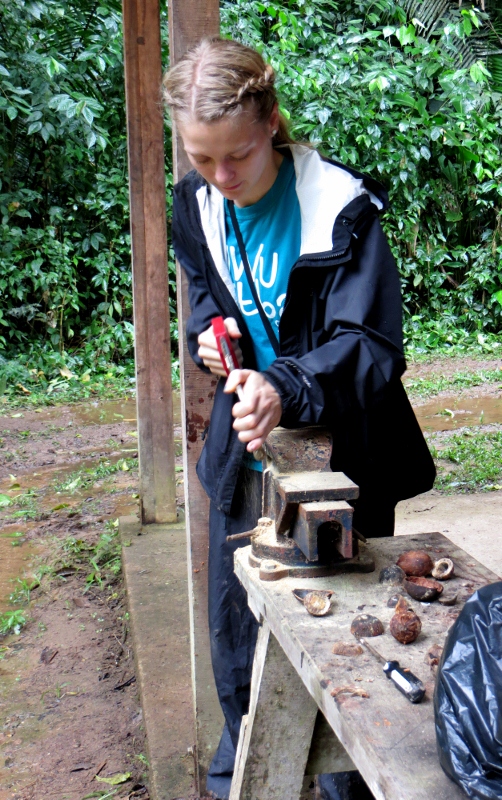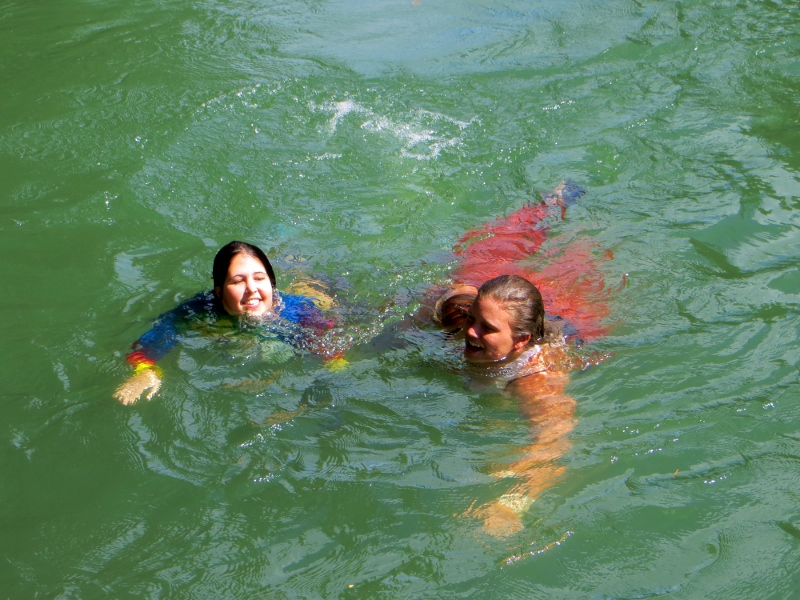Notes from the Field Spring 2013
New partnerships, bold new field courses and new additions to the BFREE experience along with annual/biannual courses punctuate BFREE’s 2013 field season.
In early January, Dr. Jerry Bricker and students from Nebraska Wesleyan University (NWU) participated in BFREE’s newly developed field course, “Field Study Methods in Tropical Ecology”. Designed to optimize BFREE’s premium location adjacent to 1.5 million acres of pristine rainforest, students spent the first few days observing and participating in field research methods presented by BFREE staff biologists. From bat netting to mist netting for birds to aquatic surveys and land mammal survey methods, students experienced authentic research in the tropical rainforest. Throughout these activities, observations were recorded, and mini research projects were developed with input from both professors and resident researchers. Research topics varied widely from ant behavior to bioluminescence. Students’ research results rounded out the week with one “Star Wars”-like presentation by a pair of students studying bioluminescence who made a grand entrance to a darkened dining room wielding the rotting fronds of a cohune palm glowing like Luke Skywalker’s light sabre!
Otterbein University returned once again in mid-January with a new twist to their multidisciplinary course combining Tropical Ecology and Cross Cultural Experiences. A senior research project in psychology and sociology compared the attitudes toward the environment and the natural world of school children from the U.S. and Belize. Conducted during a homestay in the village of San Felipe, the survey looked at the impact of television and other technologies on attitudes toward the environment. After completing their survey, Otterbein students spent time teaching the Belizean kids outdoor games like Red Rover and Duck, Duck, Goose!
Collaboration between BFREE and Ya’axche Conservation Trust has provided students the rare opportunity to experience Belize’s Crown Jewel of protected areas, the Bladen Nature Reserve. YCT rangers led hikes for most of the BFREE field courses along the Bladen River Trail in an area of the reserve that permits access for educational purposes. These guided hikes focused on the challenges of managing Belize’s highest protected area with limited staff and resources as well as how local people use forest resources in daily living practices fostering appreciation for the necessity to protect such pristine environments like the Bladen for future generations.
Sterling College students and faculty were welcomed for the sixth year at the end of January. Aquatic specialists, instructors Farley Brown and Charlotte Rosenthal, returned to previous research sites near Blue Pool and along the Bladen River to survey the aquatic life and flow of the Bladen River. Students participated in a variety of activities presented by BFREE staff biologists; including snail survey work, bat netting, bird netting and a tour of BFREE’s Agroforestry project: a shade-grown, organic and bird-friendly cacao and coffee farm.
The month of February welcomed local community college students from Independence Junior College (pictured at top) and their professor Abigail Parham for another weekend of field activities lead by BFREE Avian Biologist, William Garcia and Avian Technician, Liberato Pop. We were pleased to be able to offer field experience FOR Belizeans LED BY Belizeans!!
The month of March indeed came in like a lion for BFREE as we hosted two courses simultaneously on site. Both courses featured bold new arenas for BFREE. Next month’s News from the Field will feature a closer look at University of Florida’s School of Environmental Law’s cutting edge masters level course as well as an exciting new focused field course from University of North Carolina at Wilmington.




Leave a Reply
Want to join the discussion?Feel free to contribute!